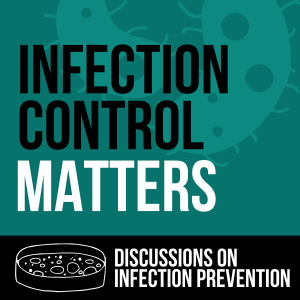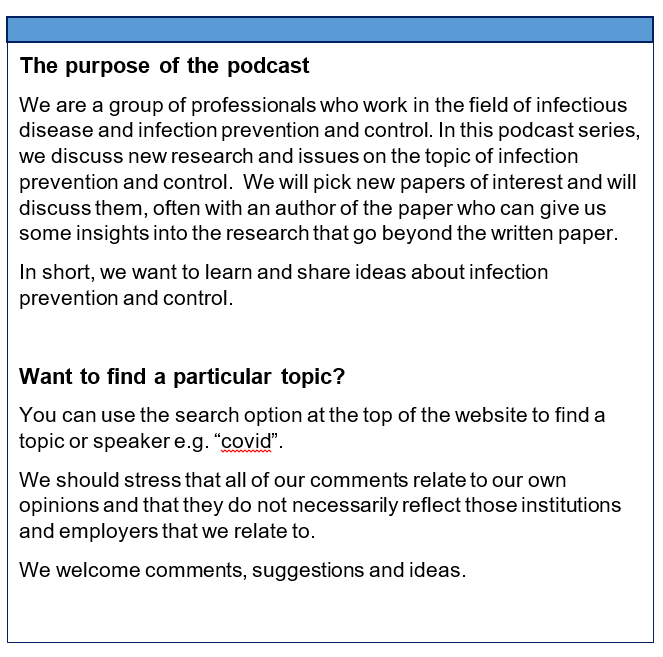Infection Control Matters
We are a group of professionals who work in the field of infectious disease and infection prevention and control. In this podcast series, we discuss new research and issues on the topic of infection prevention and control. We will pick new papers of interest and will discuss them, often with an author of the paper who can give us some insights into the research that go beyond the written paper. Authors will include nurses, doctors, academics, clinicians, administrators and leaders. We should stress that all of our comments relate to our own opinions and that they do not necessarily reflect those institutions and employers that we relate to. We welcome comment, suggestions and ideas. Please consider subscribing for updates and to find collections of topic specific podcasts at www.infectioncontrolmatters.com
Episodes

Wednesday Mar 29, 2023
Wednesday Mar 29, 2023
In this episode Brett and Martin talk to Mairéad Skally and Prof Fidelma Fitzpatrick about their efforts to minimise Clostridioides difficile infections in the Beaumont Hospital in Dublin, Ireland. Mairéad is a Surveillance Scientist and Fidelma is a Consultant Microbiologist and also Head of Department of Clinical Microbiology at the Royal College of Surgeons (Ireland). We discuss 10 years of surveillance in the Beaumont and analysis of a rich pool of data that has helped them achieve a status quo.
The paper we discuss is here:
Skally M, Bennett K, Burns K, Brennan R, Finn C, O’Connell K, et al. A decade of Clostridioides difficile infection: A constant challenge to maintain the status quo. Journal of Hospital Infection. 2023 in press https://doi:10.1016/j.jhin.2023.02.008

Thursday Mar 23, 2023
Thursday Mar 23, 2023
In this week's episode, Martin talks to Professor Jean-Yves Maillard from the Cardiff School of Pharmacy in Wales. We discuss detention, removal and prevention of biofilms in wet and dry environments. A range of papers on this topic from his group are listed below.
D. I. Centeleghe, et al. 2023 Klebsiella pneumoniae survives on surfaces as a dry biofilm Am J Infect Control https://doi:10.1016/j.ajic.2023.02.009
T. J. Tewes, et al. 2022 Raman Microscopic Analysis of Dry-Surface Biofilms on Clinically Relevant Materials Microorganisms 10 7 https://doi:10.3390/microorganisms10071369
K. Ledwoch, et al. 2022 Dry surface biofilms: what you need to know Br J Hosp Med (Lond) 83 8 1-3 https://doi:10.12968/hmed.2022.0274
K. Ledwoch, et al. 2021 Is a reduction in viability enough to determine biofilm susceptibility to a biocide? Infection Control & Hospital Epidemiology 42 12 1486-1492 https://doi:10.1017/ice.2021.42
K. Ledwoch, et al. 2020 It's a trap! The development of a versatile drain biofilm model and its susceptibility to disinfection J Hosp Infect 106 4 757-764 https://doi:10.1016/j.jhin.2020.08.010

Wednesday Mar 15, 2023
Wednesday Mar 15, 2023
In this week's episode, Brett and Martin talk to Dr Mark Garvey, Consultant Clinical Scientist at University Hospitals Birmingham in the UK. We discuss a new paper from the UHB team which looks at the practical aspects of contamination within the splash radius of a clinical hand hygiene sink in a critical care area. The range of high risk equipment within the zone is quite interesting! Papers mentioned are as below.
1. Garvey MI, Williams N, Gardiner A, Ruston C, Wilkinson M, Kiernan M, et al. The sink splash zone. J Hosp Infect. https://doi:10.1016/j.jhin.2023.01.020 PubMed PMID: 36870392.2. Garvey MI, Wilkinson MAC, Holden KL, Martin T, Parkes J, Holden E. Tap out: reducing waterborne Pseudomonas aeruginosa transmission in an intensive care unit. J Hosp Infect. 2019;102(1):75-81. https://doi:10.1016/j.jhin.2018.07.039
3. Garvey MI, Bradley CW, Holden E. Waterborne Pseudomonas aeruginosa transmission in a hematology unit? Am J Infect Control. 2018;46(4):383-6. Epub 20171128. https://doi:10.1016/j.ajic.2017.10.013
4. Garvey MI, Bradley CW, Wilkinson MAC, Bradley C, Holden E. Engineering waterborne Pseudomonas aeruginosa out of a critical care unit. Int J Hyg Environ Health. 2017;220(6):1014-9. https://doi:10.1016/j.ijheh.2017.05.011

Thursday Mar 09, 2023
Thursday Mar 09, 2023
We talk about the knowledge attitudes and practice of nurses regarding oral hygiene of dependent inpatients in this podcast with Dr Isabel Oliveira. Understanding these is an important element of improving oral care and potentially reducing hospital acquired pneumonia (HAP) more broadly. Isbael is a rehabilitation nurse with a particular focus and interest in dysphagia and oral care, including the prevention of HAP. She works at the Centre for Health Studies and Research of the University of Coimbra (CEISUC) in Portugal.
The paper referred to in this podcast is "Knowledge, attitudes and practices of nurses regarding oral hygiene of dependent inpatients".
Link: https://pubmed.ncbi.nlm.nih.gov/35680116/

Tuesday Feb 28, 2023
Tuesday Feb 28, 2023
In this episode, Brett talks to Associate Professor Matthew Davis about his clinical experience and recent systematic review, exploring the topic of whether indwelling vs intermittent catheterisation increases the risk of UTI. Matt is an Associate Professor of Physical Medicine & Rehabilitation at McGovern Medical School in Houston and has a strong clinician background in caring for people with Spinal Cord Injury.
Here are the papers we refer to in the podcast:
DAVIS, M., JETHANI, L., ROBBINS, E. & KANER, M. 2023. Is It Really the Foley? A Systematic Review of Bladder Management and Infection Risk. Top Spinal Cord Inj Rehabil, 29, 94-107.
https://meridian.allenpress.com/tscir/article-abstract/29/1/94/490861/Is-It-Really-the-Foley-A-Systematic-Review-of?redirectedFrom=fulltext
DAVIS, M. 2019. When guidelines conflict: patient safety, quality of life, and CAUTI reduction in patients with spinal cord injury. Spinal Cord Ser Cases, 5, 56.
https://pubmed.ncbi.nlm.nih.gov/31632714/

Tuesday Feb 28, 2023
Tuesday Feb 28, 2023
In this first episode of 2023, Martin talks to Melissa Rochon and Prof Judith Tanner about their recent paper in the Journal of Hospital Infection that reports on the use of patient-generated images in SSI surveillance.
Papers discussed:
1. Rochon M, et al. Image-based digital post-discharge surveillance in England: measuring patient enrolment, engagement, clinician response times, surgical site infection, and carbon footprint. J Hosp Infect. 2023;133:15-22. https://doi:10.1016/j.jhin.2023.01.001
2. Tyrer J. Digital photo at discharge: a way of monitoring surgical wounds. Nursing Times. 2022;119(9). https://www.nursingtimes.net/clinical-archive/tissue-viability/digital-photo-at-discharge-a-way-of-monitoring-surgical-wounds-08-08-2022/

Wednesday Dec 21, 2022
Wednesday Dec 21, 2022
In the final podcast of the year, we reflect on some lighthearted moments from 2022 and share our thoughts on a few favourite papers, reflections and podcasts. Being the Christmas special, it isn't too serious.. See you in 2023!
Brett's highlighted papers:
1. Peters A, et al. Impact of environmental hygiene interventions on healthcare-associated infections and patient colonization: a systematic review. Antimicrob Resist Infect Control. 2022;11(1):38. https://doi:10.1186/s13756-022-01075-1
2. Dancer SJ, et al. One size does NOT fit all: why infection prevention is difficult to randomise or control. Journal of Hospital Infection. 2022. https://doi:10.1016/j.jhin.2022.02.008
3. Mac Giolla Eain M, et al. Aerosol release, distribution, and prevention during aerosol therapy: a simulated model for infection control. Drug Deliv. 2022;29(1):10-17. https://doi:10.1080/10717544.2021.2015482
Phil's papers:
1. Grae N, et al. Prevalence of healthcare-associated infections in public hospitals in New Zealand, 2021. J Hosp Infect. 2022;131:164-172. https://doi:10.1016/j.jhin.2022.10.002
2. Bolten A, et al. The carbon footprint of the operating room related to infection prevention measures: a scoping review. J Hosp Infect. 2022. https://doi:10.1016/j.jhin.2022.07.011
Martin's papers:
1. Kato H, et al. Expansion of droplets during speaking and singing in Japanese. PLoS One. 2022;17(8):e0272122. https://doi:10.1371/journal.pone.0272122
2. Juskevicius LF, et al. Lessons learned from a failed implementation: Effective communication with patients in transmission-based precautions. Am J Infect Control. 2022. https://doi:10.1016/j.ajic.2022.09.029
3. Cawcutt KA, et al. #SoMe the Money! Value, Strategy, and Implementation of Social Media Engagement for Infectious Diseases Trainees, Clinicians, and Divisions. Clin Infect Dis. 2022;74(Suppl_3):S229-S236. https://doi:10.1093/cid/ciac063
Link to the whole Clinical Infectious Diseases social media supplement: https://academic.oup.com/cid/issue/74/Supplement_3
Link to the Norovirus song: https://youtu.be/ci7migUwURc
Hotel Quarantina (Full version) https://mcdn.podbean.com/mf/download/jh65s2/hotel_quarantina.mp3

Thursday Dec 15, 2022
Thursday Dec 15, 2022
In this week's episode, Brett and Martin talk to Dr Emma Burnett, Head of Campus, Fatima College of Health Sciences, Ajman, UAE. We discuss a recent collaborative that has resulted in two papers that examine the development of a conceptual framework that underpins the formation of an optimal infection prevention service. The papers that we discuss are listed below.
1. Robinson J, et al. Designing an optimal infection prevention service: Part 2. Journal of Infection Prevention. 2022. https://doi:10.1177/17571774221127573 2. Burnett E, et al. Designing an optimal infection prevention service: Part 1. Journal of Infection Prevention. 2022. https://doi:10.1177/17571774221127695
3. Curran ET, et al. A comparison of the nationally important infection prevention and control documents in NHS England and NHS Scotland. J Infect Prev. 2021;22(2):75-82. https://doi:10.1177/1757177420971849

Thursday Dec 08, 2022
Thursday Dec 08, 2022
In this week's episode Martin talks to Brett and Professor Maria Northcote about a recent paper on the expeciences of healthcare-associated infection on the lives of patients. The importance of communication is one of the avenues that we go down.
1. Mitchell BG, et al. Patients' perspectives of healthcare-associated infection: 'you don't know what impacts it will have on your life'. J Hosp Infect. 2022;126:93-102. doi:10.1016/j.jhin.2022.04.014 https://www.journalofhospitalinfection.com/article/S0195-6701(22)00128-1/fulltext

Thursday Dec 01, 2022
Thursday Dec 01, 2022
In this week's episode, Brett, Phil and Martin have a catch-up at the ACIPC conference in Sydney following Brett's session in which the audience were invited to select their priorities for action over the next year. Would the HCAIS that present the biggest burden (HAP and CAUTI) figure highly?

About us and contact
Feel free to contact us with suggestions on topics and or speakers. Use Twitter to contact any one or all of us:
Brett Mitchell @1healthau (Twitter link)
Martin Keirnan @emrsa15 (Twitter link)
Deb Friedman @friedmanndeb
Phil Russo: @PLR_aus (Twitter link)

Martin Kiernan: Martin is a highly experienced nurse who has worked in the field of infection prevention and control since 1990 in the acute hospital community and, more recently, in academic and industry settings with GAMA Healthcare. Martin's reputation as a research collaborator is recognised both nationally and internationally. Martin’s involvement in professional organisations such as the Infection Prevention Society and the Healthcare Infection Society has enhanced his reputation as a key opinion leader, teacher, leader, and researcher. As a result, he has been invited to act in leadership and mentoring roles to support his colleagues throughout the world in terms of infection prevention.

Professor Brett Mitchell: Brett is a Professor of Nursing with over 150 peer reviewed journal and oral conference presentations, authored several books, and has been an invited speaker at numerous infection prevention and control conferences in Australia and internationally. He is a Fellow of the Australasian College for Infection Prevention and Control and the Australian College of Nursing. Professor Mitchell is also Editor-in-Chief of Infection, Disease and Health. Professor Mitchell has experience leading nursing teams, research teams and infection prevention and control teams in both Australia and the United Kingdom. Further details: https://www.newcastle.edu.au/profile/brett-mitchell

Associate Professor Philip Russo: Phil is Director of Research, Nursing and Midwifery, Faculty of Medicine, Nursing and Health Sciences, Monash University, Victoria, Australia and Director of Nursing Research, Cabrini Health. A/Prof. Russo is the Past President of the Australasian College for Infection Prevention and Control. He has worked in both state and national positions, notably leading the establishment of the VICNISS Surveillance Program in Victoria followed by overseeing the successful implementation of the National Hand Hygiene Initiative sponsored by the Australian Commission for Safety and Quality in Health Care. Recently he has been an advisor at both a State and National level in the pandemic response. Further details: https://research.monash.edu/en/persons/philip-russo







